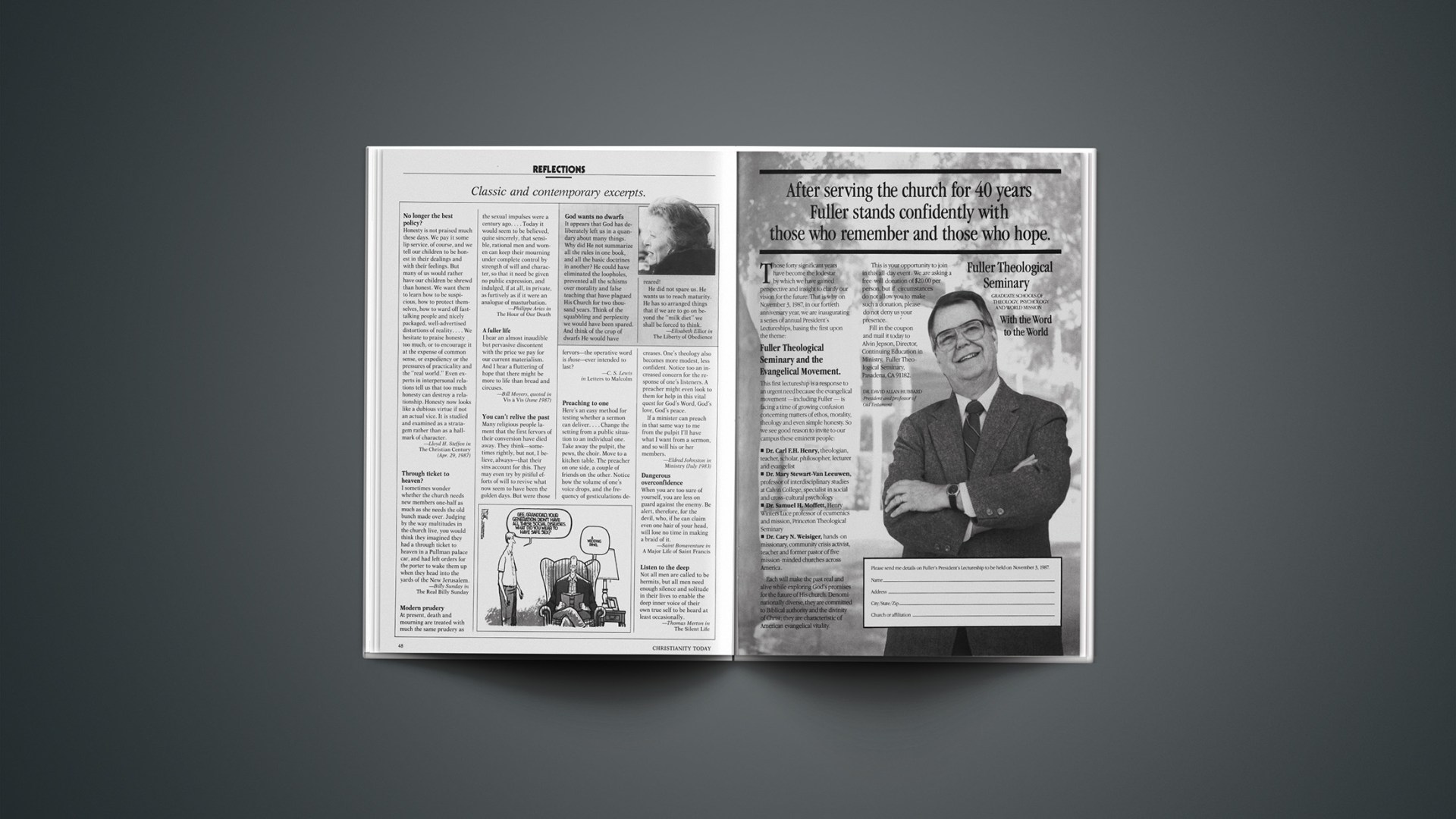No longer the best policy?
Honesty is not praised much these days. We pay it some lip service, of course, and we tell our children to be honest in their dealings and with their feelings. But many of us would rather have our children be shrewd than honest. We want them to learn how to be suspicious, how to protect themselves, how to ward off fast-talking people and nicely packaged, well-advertised distortions of reality.… We hesitate to praise honesty too much, or to encourage it at the expense of common sense, or expediency or the pressures of practicality and the “real world.” Even experts in interpersonal relations tell us that too much honesty can destroy a relationship. Honesty now looks like a dubious virtue if not an actual vice. It is studied and examined as a stratagem rather than as a hallmark of character.
—Lloyd H. Steffen in
The Christian Century (Apr. 29, 1987)
Through ticket to heaven?
I sometimes wonder whether the church needs new members one-half as much as she needs the old bunch made over. Judging by the way multitudes in the church live, you would think they imagined they had a through ticket to heaven in a Pullman palace car, and had left orders for the porter to wake them up when they head into the yards of the New Jerusalem.
—Billy Sunday in
The Real Billy Sunday
Modern prudery
At present, death and mourning are treated with much the same prudery as the sexual impulses were a century ago.… Today it would seem to be believed, quite sincerely, that sensible, rational men and women can keep their mourning under complete control by strength of will and character, so that it need be given no public expression, and indulged, if at all, in private, as furtively as if it were an analogue of masturbation.
—Philippe Aries in
The Hour of Our Death
A fuller life
I hear an almost inaudible but pervasive discontent with the price we pay for our current materialism. And I hear a fluttering of hope that there might be more to life than bread and circuses.
—Bill Moyers, quoted in Vis à Vis (June 1987)
You can’t relive the past
Many religious people lament that the first fervors of their conversion have died away. They think—sometimes rightly, but not, I believe, always—that their sins account for this. They may even try by pitiful efforts of will to revive what now seem to have been the golden days. But were those fervors—the operative word is those—ever intended to last?
—C. S. Lewis in Letters to Malcolm
Preaching to one
Here’s an easy method for testing whether a sermon can deliver.… Change the setting from a public situation to an individual one. Take away the pulpit, the pews, the choir. Move to a kitchen table. The preacher on one side, a couple of friends on the other. Notice how the volume of one’s voice drops, and the frequency of gesticulations decreases. One’s theology also becomes more modest, less confident. Notice too an increased concern for the response of one’s listeners. A preacher might even look to them for help in this vital quest for God’s Word, God’s love, God’s peace.
If a minister can preach in that same way to me from the pulpit I’ll have what I want from a sermon, and so will his or her members.
—Eldred Johnston in
Ministry (July 1983)
God wants no dwarfs
It appears that God has deliberately left us in a quandary about many things. Why did He not summarize all the rules in one book, and all the basic doctrines in another? He could have eliminated the loopholes, prevented all the schisms over morality and false teaching that have plagued His Church for two thousand years. Think of the squabbling and perplexity we would have been spared. And think of the crop of dwarfs He would have reared!
He did not spare us. He wants us to reach maturity. He has so arranged things that if we are to go on beyond the “milk diet” we shall be forced to think.
—Elisabeth Elliot in
The Liberty of Obedience
Dangerous overconfidence
When you are too sure of yourself, you are less on guard against the enemy. Be alert, therefore, for the devil, who, if he can claim even one hair of your head, will lose no time in making a braid of it.
—Saint Bonaventure in A Major Life of Saint Francis
Listen to the deep
Not all men are called to be hermits, but all men need enough silence and solitude in their lives to enable the deep inner voice of their own true self to be heard at least occasionally.
—Thomas Merton in The Silent Life



